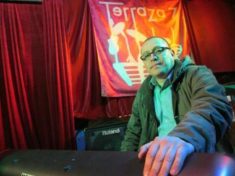Freddy Castiblanco is a transnational activist, small-business owner, and cultural entrepreneur in Queens. His life and work crosses many borders including those between Bogotá, where he was born and educated as a doctor, and New York City, to where he immigrated in 2000 and where, since 2002, he owns Terraza 7 –– the noted concert venue, bar, and cafe –– that has become a focal point for Latin American music and community activism along the Elmhurst-Jackson Heights border. In Colombia, Castiblanco's medical career included work with peasant and indigenous populations in the Catatumbo and Orinoquía regions as well as Emergency Room patients in Bogotá. In the United States, his work has expressed by example the promise of sustainable, community-scale capitalism, exemplified by Terraza 7, that aims to foster local, nonexploitative growth through nurturing the arts and empowering immigrants. Like his work at Terraza 7, Castiblanco's personal activism operates transnationally, nationally, and locally: transnationally he has fostered international discussion in Queens about Human Rights in Colombia and he has been a member of the NY chapter of the Polo Democrático Alternativo Colombian political party; nationally, he has spoken, more than once, at the White House in defense of immigrants and small businesses and through the Main Street Alliance he has testified before Congress for the right to health care for 50 million uninsured Americans; in New York State, he has been a spokesman for Make the Road Small Business United Project; in New York City, he was part of the eventually successful coalition that advocated paid sick day leave for all New Yorkers, over the opposition of the Bloomberg administration; and in Queens, Castiblanco created the Roosevelt Avenue Community Alliance, which joins small-business owners, street vendors, and residents, who advocate an alternative model to the proliferation of so-called Business Improvement Districts that threaten local commerce with new rents and taxes for services that "the community has already paid for with its taxes."

